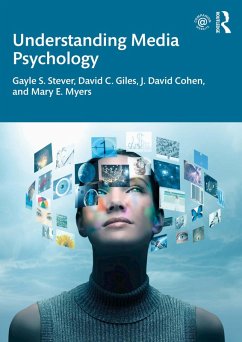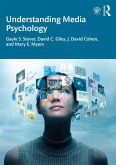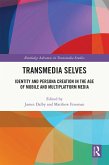Gayle S. Stever, David C. Giles, J. David Cohen, Mary E. Myers
Understanding Media Psychology (eBook, PDF)
52,95 €
52,95 €
inkl. MwSt.
Sofort per Download lieferbar

26 °P sammeln
52,95 €
Als Download kaufen

52,95 €
inkl. MwSt.
Sofort per Download lieferbar

26 °P sammeln
Jetzt verschenken
Alle Infos zum eBook verschenken
52,95 €
inkl. MwSt.
Sofort per Download lieferbar
Alle Infos zum eBook verschenken

26 °P sammeln
Gayle S. Stever, David C. Giles, J. David Cohen, Mary E. Myers
Understanding Media Psychology (eBook, PDF)
- Format: PDF
- Merkliste
- Auf die Merkliste
- Bewerten Bewerten
- Teilen
- Produkt teilen
- Produkterinnerung
- Produkterinnerung

Bitte loggen Sie sich zunächst in Ihr Kundenkonto ein oder registrieren Sie sich bei
bücher.de, um das eBook-Abo tolino select nutzen zu können.
Hier können Sie sich einloggen
Hier können Sie sich einloggen
Sie sind bereits eingeloggt. Klicken Sie auf 2. tolino select Abo, um fortzufahren.

Bitte loggen Sie sich zunächst in Ihr Kundenkonto ein oder registrieren Sie sich bei bücher.de, um das eBook-Abo tolino select nutzen zu können.
Understanding Media Psychology is the perfect introductory textbook to the growing field of media psychology and its importance in society, summarizing key concepts and theories to provide an overview of topics in the field.
- Geräte: PC
- ohne Kopierschutz
- eBook Hilfe
- Größe: 22.46MB
Andere Kunden interessierten sich auch für
![Understanding Media Psychology (eBook, ePUB) Understanding Media Psychology (eBook, ePUB)]() Gayle S. SteverUnderstanding Media Psychology (eBook, ePUB)51,95 €
Gayle S. SteverUnderstanding Media Psychology (eBook, ePUB)51,95 €![Transmedia Selves (eBook, PDF) Transmedia Selves (eBook, PDF)]() Transmedia Selves (eBook, PDF)42,95 €
Transmedia Selves (eBook, PDF)42,95 €![Objectification (eBook, PDF) Objectification (eBook, PDF)]() Susanna PaasonenObjectification (eBook, PDF)31,95 €
Susanna PaasonenObjectification (eBook, PDF)31,95 €![Psychology of Music (eBook, PDF) Psychology of Music (eBook, PDF)]() Siu-Lan TanPsychology of Music (eBook, PDF)62,95 €
Siu-Lan TanPsychology of Music (eBook, PDF)62,95 €![How Music Empowers (eBook, PDF) How Music Empowers (eBook, PDF)]() Steven GambleHow Music Empowers (eBook, PDF)42,95 €
Steven GambleHow Music Empowers (eBook, PDF)42,95 €![Achieving Peak Performance in Music (eBook, PDF) Achieving Peak Performance in Music (eBook, PDF)]() Sarah SinnamonAchieving Peak Performance in Music (eBook, PDF)34,95 €
Sarah SinnamonAchieving Peak Performance in Music (eBook, PDF)34,95 €![Kinaesthesia in the Psychology, Philosophy and Culture of Human Experience (eBook, PDF) Kinaesthesia in the Psychology, Philosophy and Culture of Human Experience (eBook, PDF)]() Roger SmithKinaesthesia in the Psychology, Philosophy and Culture of Human Experience (eBook, PDF)20,95 €
Roger SmithKinaesthesia in the Psychology, Philosophy and Culture of Human Experience (eBook, PDF)20,95 €-
-
-
Understanding Media Psychology is the perfect introductory textbook to the growing field of media psychology and its importance in society, summarizing key concepts and theories to provide an overview of topics in the field.
Dieser Download kann aus rechtlichen Gründen nur mit Rechnungsadresse in A, B, BG, CY, CZ, D, DK, EW, E, FIN, F, GR, HR, H, IRL, I, LT, L, LR, M, NL, PL, P, R, S, SLO, SK ausgeliefert werden.
Produktdetails
- Produktdetails
- Verlag: Taylor & Francis eBooks
- Seitenzahl: 340
- Erscheinungstermin: 28. September 2021
- Englisch
- ISBN-13: 9781000457841
- Artikelnr.: 62650038
- Verlag: Taylor & Francis eBooks
- Seitenzahl: 340
- Erscheinungstermin: 28. September 2021
- Englisch
- ISBN-13: 9781000457841
- Artikelnr.: 62650038
- Herstellerkennzeichnung Die Herstellerinformationen sind derzeit nicht verfügbar.
Gayle S. Stever is Professor of Psychology for Empire State College of the State University of New York, USA. She works in the areas of developmental psychology, media psychology, and fan studies. Her writing has centered around celebrity-audience relationships, the nature of attachment both within and outside of a media context, evolutionary psychology as it relates to media, and mixed-methods research.
David C. Giles is Senior Lecturer in Psychology at the University of Winchester, UK. He explores the impact of media on human behavior with a particular interest in celebrity-audience relationships, the dynamics of online interaction, qualitative research methods, and psychological issues around artistic and cultural activities.
J. David Cohen is a Visitng Instructor in Psychology for Empire State College of the State University of New York, USA. He passionately pursues how media, technology, celebrity, and storytelling impact humans. Specific areas of interest include entertainment media, marketing and persuasion, video games, and mediated violence.
Mary E. Myers is program coordinator for the Doctor of Strategic Communications program at Regent University, Virginia, USA. She has developed and teaches in a unique applied strategic communication doctoral program. Her research work primarily centers on the discovery of an early educational radio broadcaster; she also explores parental attachment, social media, and crisis communication.
David C. Giles is Senior Lecturer in Psychology at the University of Winchester, UK. He explores the impact of media on human behavior with a particular interest in celebrity-audience relationships, the dynamics of online interaction, qualitative research methods, and psychological issues around artistic and cultural activities.
J. David Cohen is a Visitng Instructor in Psychology for Empire State College of the State University of New York, USA. He passionately pursues how media, technology, celebrity, and storytelling impact humans. Specific areas of interest include entertainment media, marketing and persuasion, video games, and mediated violence.
Mary E. Myers is program coordinator for the Doctor of Strategic Communications program at Regent University, Virginia, USA. She has developed and teaches in a unique applied strategic communication doctoral program. Her research work primarily centers on the discovery of an early educational radio broadcaster; she also explores parental attachment, social media, and crisis communication.
Preface
Acknowledgments
1. Media and Media Psychology
Gayle S. Stever
2. Key Theories and Concepts from Media Psychology
Gayle S. Stever
3. Research Methods
Gayle S. Stever
4. Positive Psychology, Moral Reasoning, and Prosocial Behavior
Gayle S. Stever
5. Social Justice and the Media: Gender, Class, and Disability
Gayle S. Stever
6. Social Justice and the Media: Race, Ethnicity, and Religion
Gayle S. Stever
7. Aliens Eating Reese's: Media Influence and Advertising
J. David Cohen
8. Propaganda, Fake News, and Deepfaking
Mary E. Myers
9. Processes of Audience Involvement
Gayle S. Stever
10. Dark Media: Violence, Pornography, and Addiction
J. David Cohen
11. Join the Adventure: The Psychology of Gaming
J. David Cohen
12. The Social Nature of Media
Gayle S. Stever
13. The Turbulent 20s: Covid-19 and the Media
Gayle S. Stever & J. David Cohen
14. The Future of Media
David C. Giles
Index
Acknowledgments
1. Media and Media Psychology
Gayle S. Stever
2. Key Theories and Concepts from Media Psychology
Gayle S. Stever
3. Research Methods
Gayle S. Stever
4. Positive Psychology, Moral Reasoning, and Prosocial Behavior
Gayle S. Stever
5. Social Justice and the Media: Gender, Class, and Disability
Gayle S. Stever
6. Social Justice and the Media: Race, Ethnicity, and Religion
Gayle S. Stever
7. Aliens Eating Reese's: Media Influence and Advertising
J. David Cohen
8. Propaganda, Fake News, and Deepfaking
Mary E. Myers
9. Processes of Audience Involvement
Gayle S. Stever
10. Dark Media: Violence, Pornography, and Addiction
J. David Cohen
11. Join the Adventure: The Psychology of Gaming
J. David Cohen
12. The Social Nature of Media
Gayle S. Stever
13. The Turbulent 20s: Covid-19 and the Media
Gayle S. Stever & J. David Cohen
14. The Future of Media
David C. Giles
Index
Preface
Acknowledgments
1. Media and Media Psychology
Gayle S. Stever
2. Key Theories and Concepts from Media Psychology
Gayle S. Stever
3. Research Methods
Gayle S. Stever
4. Positive Psychology, Moral Reasoning, and Prosocial Behavior
Gayle S. Stever
5. Social Justice and the Media: Gender, Class, and Disability
Gayle S. Stever
6. Social Justice and the Media: Race, Ethnicity, and Religion
Gayle S. Stever
7. Aliens Eating Reese's: Media Influence and Advertising
J. David Cohen
8. Propaganda, Fake News, and Deepfaking
Mary E. Myers
9. Processes of Audience Involvement
Gayle S. Stever
10. Dark Media: Violence, Pornography, and Addiction
J. David Cohen
11. Join the Adventure: The Psychology of Gaming
J. David Cohen
12. The Social Nature of Media
Gayle S. Stever
13. The Turbulent 20s: Covid-19 and the Media
Gayle S. Stever & J. David Cohen
14. The Future of Media
David C. Giles
Index
Acknowledgments
1. Media and Media Psychology
Gayle S. Stever
2. Key Theories and Concepts from Media Psychology
Gayle S. Stever
3. Research Methods
Gayle S. Stever
4. Positive Psychology, Moral Reasoning, and Prosocial Behavior
Gayle S. Stever
5. Social Justice and the Media: Gender, Class, and Disability
Gayle S. Stever
6. Social Justice and the Media: Race, Ethnicity, and Religion
Gayle S. Stever
7. Aliens Eating Reese's: Media Influence and Advertising
J. David Cohen
8. Propaganda, Fake News, and Deepfaking
Mary E. Myers
9. Processes of Audience Involvement
Gayle S. Stever
10. Dark Media: Violence, Pornography, and Addiction
J. David Cohen
11. Join the Adventure: The Psychology of Gaming
J. David Cohen
12. The Social Nature of Media
Gayle S. Stever
13. The Turbulent 20s: Covid-19 and the Media
Gayle S. Stever & J. David Cohen
14. The Future of Media
David C. Giles
Index







